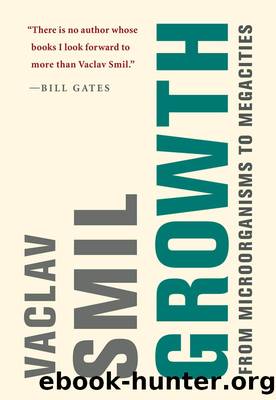Growth: From Microorganisms to Megacities by Vaclav Smil

Author:Vaclav Smil [Smil, Vaclav]
Language: eng
Format: epub
Tags: 21st Century, Civilization, Development & Growth, Ecology, Environmental Policy, History, Political Science, Population, Public Policy, Science & Technology, Sociology
ISBN: 9780262042833
Google: 52yuDwAAQBAJ
Amazon: B07XKXFLK3
Publisher: The MIT Press
Published: 2019-09-06T03:00:00+00:00
5 Populations, Societies, Economies: or growth of the most complex assemblies
Terms always need clarifying in order to avoid misunderstandings and ambiguities. This book deals with nothing but the growth of systems, that is, entities consisting of connected and interdependent parts that make up specific structures and provide desired functions. Most of them—including organisms, energy converters, machines, and other artifacts—are complex according to even the most restrictive definition of that term. But there is a clear hierarchy of complex systems with, to use the organismic sequence, tissues above cells, organs above tissues, complete functioning species above organs, and populations above species. The highest levels of systemic complexity will be the subject of this chapter, focusing on the growth of human populations and their grand-scale creations, cities, states and empires, economies and civilizations.
The growth of human populations can be examined by focusing on several key variables ranging from basic vital statistics (birth- and death rates) and fertility rates (all of them could be studied as aggregates or in age-specific form) to natural growth (births minus deaths) and overall population growth (natural rate plus net migration). The spatial resolution of such inquiries can range from small communities to the global population, and time spans can go from a single generation to the entire sweep of human evolution, and I will include most of these diverse aspects in my systematic examination of population growth.
I will start with tracing the long-term growth of the global population and contrast its lengthy span of very low increments with rapid gains during the 20th century, and I will also look at possible outcomes by the middle and the end of the 21st century. Inevitably, this long-term reconstruction will also consider some notable past fears and forecasts and follow their subsequent fate. Then I will present population growth trajectories of the world’s most populous nations (including China, India, and the United States) and conclude the section by looking at the unfolding population aging and decline that is now the norm in most of the world’s affluent countries, with Japan leading the trend.
Starting the chapter with population growth is an obvious choice, but the further order is necessarily arbitrary as the growth of cities, empires, and economies has progressed through dynamic interaction of all of these complex systems. Following the evolutionary sequence, cities (drawing their energies and materials from their expanding hinterlands) were the first complex anthropogenic creations. Their growth during antiquity and the Middle Ages was limited by inherent difficulties in securing sufficient food, energy, and raw materials in societies relying on traditional modes of crop production (with yields remaining low and stagnant for centuries), resource extraction (overwhelmingly dependent on animate labor), and transportation (in the absence of strong prime movers, good roads and vehicles, it was slow and expensive on land, cheaper but unreliable by shipping).
As a result, large cities were uncommon and, in addition, many relatively large ancient cities were relatively short-lived, victims of environmental change, neighborly aggression or dynastic exhaustion. Urban growth became more common only during
Download
This site does not store any files on its server. We only index and link to content provided by other sites. Please contact the content providers to delete copyright contents if any and email us, we'll remove relevant links or contents immediately.
The Secret History by Donna Tartt(16621)
The Social Justice Warrior Handbook by Lisa De Pasquale(11489)
Thirteen Reasons Why by Jay Asher(7788)
This Is How You Lose Her by Junot Diaz(5769)
Weapons of Math Destruction by Cathy O'Neil(5036)
Zero to One by Peter Thiel(4824)
The Myth of the Strong Leader by Archie Brown(4789)
Promise Me, Dad by Joe Biden(4447)
Beartown by Fredrik Backman(4415)
Stone's Rules by Roger Stone(4415)
How Democracies Die by Steven Levitsky & Daniel Ziblatt(4398)
The Fire Next Time by James Baldwin(4342)
100 Deadly Skills by Clint Emerson(4076)
A Higher Loyalty: Truth, Lies, and Leadership by James Comey(4032)
Rise and Kill First by Ronen Bergman(4012)
The David Icke Guide to the Global Conspiracy (and how to end it) by David Icke(3881)
The Farm by Tom Rob Smith(3872)
Secrecy World by Jake Bernstein(3782)
The Doomsday Machine by Daniel Ellsberg(3730)
